IN THIS ISSUE
- Letter from our Executive Director
- Issue Brief: Refugees: Global Trends
- Organization Profile: Oxfam – Helping Refugees Since its Inception
- Goalmaker: Empowering Resilience: Supporting Women and Children amid Ukraine’s Conflict
- Member Blogs
- Welcome New Members
- GlobalWA Community Events
- Career Center
- GlobalWA Events
Letter from our Executive Director
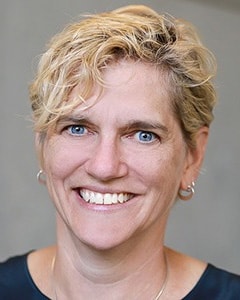
Refugees and internally displaced persons (IDPs) do not choose to leave their homes – it is an action they are forced to do. To date, nearly 120 million people have been forced to escape armed conflict, generalized violence, human rights abuses, or natural or man-made disasters. This is a 200% increase since I began working on this issue in 2012.
These numbers are unprecedented and sobering. As a part Women of the World’s 2024 focus on refugees, we are publishing this Special Edition Issue Campaign on the plight of refugees and IDPs today. We have been given special permission to republish the UNHCR, The UN Refugee Agency’s Global Trends summary report while also diving into how our members, Oxfam and Global Communities, are assisting refugees in their programs. We are encouraged to hear about how our other members are helping refugees and IDPs through short summaries that are also included here.
To deeper understand the refugee experience, we encourage you to attend a free event on October 22 at the Gates Discovery Center in Seattle: Hope Away from Home | An Evening with Emi Mahmoud – a Sudanese-American slam poet, humanitarian, and UNHCR Goodwill Ambassador. We invite you to read our profile article about Emi to help you get excited about meeting this warm and dynamic former refugee.
We are also very pleased to announce we have EXTENDED our Early Bird rate for our 15th Annual Goalmakers Conference to October 15th! The agenda and speakers will be announced in the next few days with an exciting new focus on career development for global development professionals. We invite you to join us at this marquee event – register here today and don’t miss out on this opportunity.
Jane Meseck
Interim Executive Director
Issue Brief
Refugees: Global Trends
When thinking about the growing global forced displacement crisis, we felt we should go directly to the experts: UNHCR, The UN Refugee Agency (USA for UNHCR is a GlobalWA member). With permission, we have republished their summary report on their latest Global Trends report, published in June 2024. You can access the full report and the data here. This report, as you will see, provides key statistical trends on forced displacement, including the latest official statistics on refugees, asylum-seekers, internally displaced and stateless people, as well as the number of refugees who have returned home.
At the end of 2023, an estimated 117.3 million people worldwide were forcibly displaced due to persecution, conflict, violence, human rights violations and events seriously disturbing the public order. Based on operational data, UNHCR estimates that forced displacement has continued to increase in the first four months of 2024 and by the end of April 2024 is likely to have exceeded 120 million. The increase to 117.3 million at the end of 2023 constitutes a rise of 8 per cent or 8.8 million people compared to the end of 2022 and continues a series of year-on-year increases over the last 12 years. One in every 69 people, or 1.5 per cent of the entire world’s population, is now forcibly displaced. This is nearly double the 1 in 125 people who were displaced a decade ago.

“Behind these stark and rising numbers lie countless human tragedies. That suffering must galvanize the international community to act urgently to tackle the root causes of forced displacement.”
Filippo Grandi, the UN High Commissioner for Refugees
People forcibly displaced worldwide | 2014 – 2023
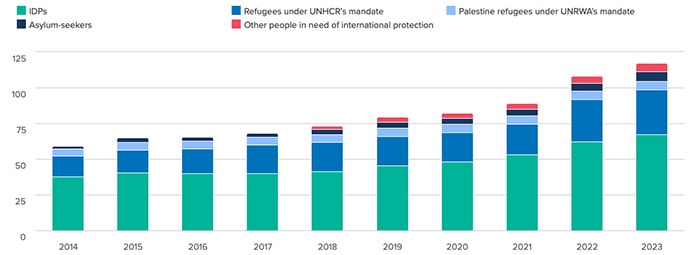
Some Palestine refugees under UNRWA’s mandate in Gaza have also been internally displaced. In this graph, these internally displaced refugees under UNRWA’s mandate are only counted once, under the figure for ‘Palestine refugees under UNRWA’s mandate.
New forced displacements in 2023
New and ongoing conflicts have driven forced displacement across the globe. Conflict in Sudan broke out in April 2023, causing one of the largest humanitarian and displacement crises in the world. More than 6 million people were displaced within the country, with a further 1.2 million fleeing to neighbouring countries. In Myanmar, escalating violence following the military takeover in February 2021, displaced more than 1.3 million people within the country in 2023. While in the State of Palestine, UNRWA estimates that between October and December 2023, up to 1.7 million people (or over 75 per cent of the population) were displaced by the conflict in the Gaza Strip, with some forced to flee multiple times.
Conflict-driven displacement
Forced displacement is a consequence of the failure to uphold peace and security. As the frequency, duration and intensity of conflicts have increased, as measured by conflict-related fatalities in the graph below, so has the number of people forced to flee each year.
Conflict-related fatalities | 2009 – 2023
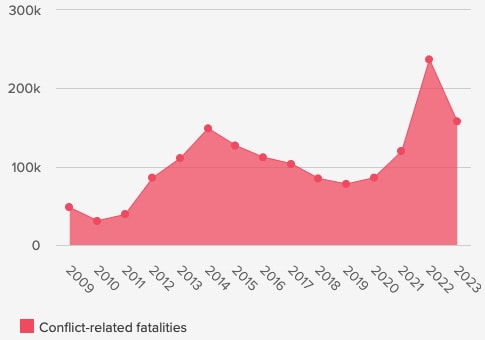
Data on conflict-related deaths provided by the Uppsala Conflict Data Program. Data for 2023 is sourced from the UCDP Candidate Event Dataset, with conflict events with the highest degree of uncertainty excluded (code status equals “Check”). Fatalities combine State-based violence, non-State violence and one-sided violence.
People forced to flee each year | 2009 – 2023
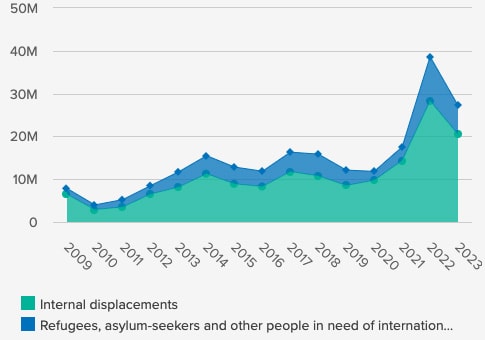
This figure includes estimates of new internal displacements. These refer to movements, and are a comprehensive cumulative figure of displacement. Depending on certain situations the same people can be displaced several times over a given period and would therefore be reported multiple times in the cumulative figures.
Refugees
The global refugee population increased by 7 per cent to reach 43.4 million during the year. This includes 31.6 million refugees and people in a refugee-like situation and 5.8 million other people in need of international protection under UNHCR’s mandate, as well as 6 million Palestinian refugees under UNRWA’s mandate. Compared to a decade ago, the total number of refugees globally has more than tripled. The largest proportion of refugees globally were from Afghanistan and Syria, both with 6.4 million each, and together equivalent to one-third of all refugees under UNHCR’s mandate. These were followed by Venezuela (6.1 million refugees and other people in need of international protection) and Ukraine (6.0 million refugees). Most refugees remain near their country of origin, with 69 per cent hosted in neighbouring countries at the end of 2023. Low- and middle-income countries continue to host the majority of the world’s refugees, with 75 per cent of refugees living in low- and middle-income countries.

SPOTLIGHT
Route-based approach

© UNHCR/Alessio Mamo
Refugees fleeing conflict or persecution may travel on routes alongside migrants. While the rights of refugees and migrants are distinct, those using the same routes face similar risks. According to interviews with 31,500 refugees and migrants along the Central Mediterranean route, the predominant risks include severe threats to life, rape, torture, kidnapping, arbitrary detention, robbery and human trafficking, among other risks. Between 2021 and 2023, 950 people are known to have died while crossing the Sahara Desert, although the actual number is believed to be much higher. During the same period, 7,600 people on the move died or went missing in the Mediterranean Sea. UNHCR is working with partners to develop a data-driven route-based approach to strengthen protection for refugees and migrants, ensuring they have access to the services they need along key routes.
Internally displaced people
Most people who are forced to flee never cross an international border, remaining displaced within their own countries. Known as internally displaced people, or IDPs, they account for 58 per cent of all forcibly displaced people. At the end of 2023, 68.3 million people remained internally displaced due to conflict and violence. An estimated 9.1 million people were displaced within Sudan, the largest internally displaced population ever reported. This was followed by Syria (7.2 million), and the Democratic Republic of the Congo (6.7 million).

SPOTLIGHT
Conflict in Sudan
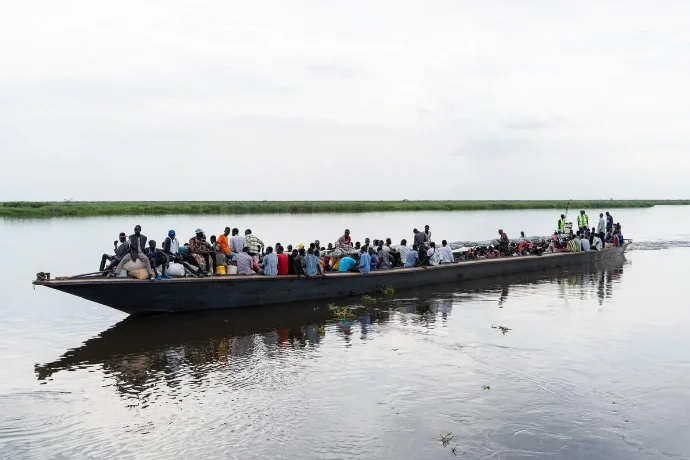
Pictured: Sudanese refugees and South Sudanese returnees travel on a crowded barge from Renk to Malakal, South Sudan. The journey will take two days. © UNHCR/Ala Kheir
Conflict in Sudan broke out in April 2023. An estimated 1.2 million people had fled the country by the end of the year, with almost all Sudanese refugees hosted by neighboring countries. A further 9.1 million Sudanese were displaced within the country, including people displaced by previous conflict. Sudan now has the largest internally displaced population ever reported. Prior to the April conflict, Sudan was also host to almost 1 million refugees, primarily from Eritrea, South Sudan and Syria. Many were forced to return to their home countries prematurely or move on to other countries. Thousands of people are still being displaced in Sudan daily. Hunger is widespread, with 20 million people (42 per cent of the entire population) facing acute food insecurity.
Solutions
In 2023, nearly 1.1 million refugees from 39 countries decided to return home from a total of 93 countries of asylum. Four out of five of those returning were Ukrainian or South Sudanese. However, as most returns occurred in contexts not entirely conducive to return in safety and dignity, they may not be sustainable. In addition, 5.1 million people displaced within their own country returned to their place of origin during the year. Nearly 62 per cent of all IDP returns were within the Democratic Republic of the Congo (1.8 million) and Ukraine (1.3 million). According to official government data, 158,700 refugees were resettled to third countries in 2023, representing 35 per cent more (40,000) than during the previous year. Despite the uptick in numbers, this still only accounted for 8 per cent of the estimated 2 million individuals globally identified by UNHCR as in need of resettlement. A further 30,800 refugees acquired the citizenship of their host country during the year and were locally integrated.
Durable solutions for refugees | 2019 – 2023
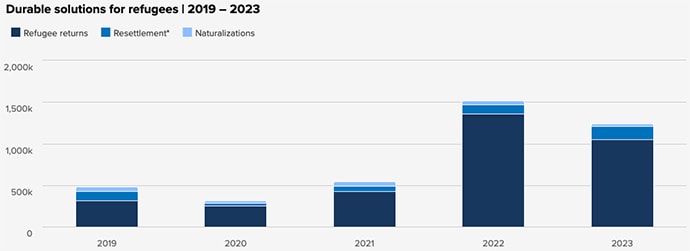
* Resettlement figures are according to government statistics.
SPOTLIGHT
Forced displacement and climate change
Climate change is exacerbating the protection needs and risks for forcibly displaced people and contributing to new, onward and protracted displacement. Extreme weather events, such as droughts, floods and extreme heat, are becoming more frequent and more intense. These have often impacted countries experiencing new or escalating conflicts. Without urgent adaptation, mitigation and measures to address loss and damage, climate change impacts are expected to increasingly, and disproportionately, affect climate vulnerable States and communities, including forcibly displaced people.
At the end of 2023, almost 3 in 4 forcibly displaced people were living in countries with high-to-extreme exposure to climate-related hazards.
Nearly 1 in 2 were living in countries where they also remained exposed to conflict.
Climate-related hazards, countries with more than one conflict-related death per 100,000 (2022) and the number of forcibly displaced people per country (2023)

Climate-related hazards is an average in the period between 1981 and 2010. The number of forcibly displaced people located in a country (2023) and countries with more than one conflict-related death per 100,000 (2022) are indicated on top. © UNHCR
In addition to the above-mentioned members, the following GlobalWA members and Pangea grant partners have programs and services in the communities where they work to assist refugees and displaced persons:
With over 117 million people forcibly displaced worldwide, including 43 million refugees, this crisis is one of the defining challenges of our time. Amid the immense hardships caused by war, political instability and the growing threat of climate disasters, it is crucial to remember that health is a human right that transcends borders.
For more than four decades, Americares has worked alongside partner organizations to meet the health needs of refugees and other displaced populations globally. Americares is currently supporting people displaced by natural disasters, those displaced by war in Gaza, Syria and Ukraine and those fleeing the crisis in Venezuela.
In Gaza, Americares is responding to the health needs of families affected by the war, delivering over 23 tons of medicine and medical supplies, supporting mobile medical teams and providing mental health support for frontline health workers. And in Colombia, Americares health clinics have been a lifeline for Venezuelans who have been forced to flee due to the mounting crisis in the country.
As the refugee crisis grows, Americares remains committed to providing displaced populations the health care they need to survive, recover and rebuild their lives.
Global Communities has a rich history of providing emergency aid and protection services to refugees and internally displaced people in many crisis settings, from Ukraine and Gaza to Syria and Guatemala. This includes our Child Protection in Emergencies programming, which supports the well-being of children and addresses risks created or exacerbated by crises, such as abuse and family separation. We build protective environments, strengthen children’s resilience and work to prevent further harm. In Syria, for example, we manage several Child-Friendly Spaces (CFS) for children living in displacement camps. Given the dire conditions in the camps, CFS create safe and welcoming environments where children engage in age-appropriate activities, receive psychosocial services and learn positive coping mechanisms. We also offer parenting sessions and cash assistance, for instance, to ensure that children have stable housing. In Ukraine, we partner with community-based organizations to fill gaps in state services. We engage children in art therapy classes, learn and play activities, and community events to support their healing and recovery. We also foster social cohesion between displaced people and host communities. For example, our recreational activities bring children from the community together with those who have fled the fighting to encourage integration and minimize tensions.
Global Mentorship Initiative is a US-based global nonprofit bridging the gap between graduation and first career jobs for underrepresented young professionals and refugees from diverse communities. Through leveraging digital resources, mentorship, AI, and human connection, we are building a more equitable workforce of tomorrow’s leaders.
GMI’s flagship program is a structured, 12-week, virtual, one-to-one mentorship with a career professional. In four years, GMI has scaled from supporting 20 students to now over 7,000 in 100 countries, including 8 refugee camps.
GMI has supported over 500 refugee learners, many living in camps across Africa and Lebanon. 72% are employed within six months of graduating, in camps where the formal employment rate can be as low as 10%. GMI has partnered with the UNHCR to mentor 1,000 refugee learners over the next two years and support our corporate partners in hiring these bright, motivated candidates. For more information about how you can mentor, sponsor, or hire refugee learners, please contact ravenna.hennane@globalmentorship.org.
International Rescue Committee
Founded at the call of Albert Einstein in 1933, the International Rescue (IRC) helps people whose lives are shattered by conflict and disaster to survive, recover, and gain control of their future. IRC has provided services to uprooted children and families for over 90 years globally, and in Seattle since 1976. Our approach has four important aspects:
- Toughest places focus. Responding quickly and aiming to stay as long as needed in the world’s toughest and most remote places.
- Putting people first. Developing and deploying a wide range of programs to address people’s needs and make the greatest impact.
- Relentless improvement. Constantly adapting and improving our programs.
- Building community. Helping people become part of their new communities worldwide, including Europe and the Americas.
In over 40 countries, the IRC is one of the only global organizations that works across the entire arc of crisis—from war zones to refugee resettlements—as we help millions from harm to a new home.
In Washington, for most newly arrived families, IRC is the hand that leads them through finding housing and employment, enrolling children into schools, and finding healthcare.
Sign up for our Newsletter to our local Seattle office to stay updated with all activities. Please contact Gul Siddiqi, Development Manager, at gul.siddiqi@rescue.org for any questions related to Donations, Corporate Volunteer Engagement, In-Kind Drives, and Partnerships.
War, violence, and oppression have displaced millions globally, with Africa experiencing the fastest-growing refugee crisis. Refugees face trauma, unsafe conditions, and competition over dwindling resources, leading to hunger and instability. Mercy Corps tackles poverty and displacement by addressing root causes and supporting long-term recovery after other organizations leave. Their first priority is meeting immediate needs—providing food, water, clothing, and hygiene essentials. Then, they focus on long-term recovery, offering cash assistance through e-cash or vouchers to help refugees meet personal needs, restart businesses, and regain independence.
Mercy Corps also emphasizes mental health support. Conflict-affected children and youth access skill-building activities, helping restore normalcy and meet psychosocial needs. Women and LGBTQ+ individuals are connected with support networks, helping them rebuild their lives in new environments.
Operation Snow Leopard (OSL) is a US-based nonprofit founded immediately after Kabul’s fall in August 2021. OSL’s primary mission is to safely evacuate and resettle at-risk Afghans, with a strong focus on women and children. We assist vulnerable groups, including women leaders, human rights defenders, lawyers, journalists, interpreters, doctors, activists, and religious minorities. Entirely run by volunteers, including former military personnel, civilians, and Afghans, OSL has conducted dozens of missions, helping nearly 1900 at-risk Afghans evacuate and relocate. OSL raises funds for mission essentials like food, lodging, medical care, travel, and documentation (passports, visas) for Afghans.
Since August 2021, OSL accepted a specific mission to help female Afghan Parliamentarians who were at risk of Taliban retribution. Despite engaging with over forty nations for resettlement pathways over the past two years, OSL was surprised to receive only a few offers. In 2022, OSL partnered with the Inter-Parliamentary Union, participating in international dialogues to aid at-risk Parliamentarians. OSL’s efforts included attending IPU General Assemblies in Bahrain and Geneva and coordinating with the UN. However, despite some progress, government and international institutions have not resolved these high-profile individuals’ resettlement issues. OSL actively renews calls for countries to accept these courageous women and their staff, who bravely risked everything when they stood up for democracy.
Outright International works with partners around the globe to strengthen the capacity of the LGBTIQ human rights movement, document and amplify human rights violations, and advocate for inclusion and equality. As part of this mission, Outright aims to ensure that LGBTIQ people are fully integrated throughout all elements of the humanitarian program cycle, with the goal of improving respect for, protection of, and fulfillment of the rights of LGBTIQ people before, during, and after humanitarian crises. This includes advocating with and supporting humanitarian coordination systems and actors to be more inclusive of LGBTIQ people and organizations; preparing and creating opportunities for LGBTIQ activists to engage with and influence these systems and actors; co-developing, promoting, and increasing inclusive humanitarian programming by LGBTIQ groups and within mainstream organizations; and ensuring that measurement, evaluation, accountability, and learning systems are more sensitive and responsive to LGBTIQ people affected by crisis.
Around the world, Oxfam partners with local organizations to help refugees and other displaced people with their immediate basic needs for clean water, shelter, food, and work as well as advocate for their long-term wellbeing—both in their own nations, and in the countries that host them. We engage with allies and government officials at all levels to focus on peace and find sustainable solutions to the conflict and violence that ruin so many lives. We push for wealthy countries to welcome refugees and boldly attend to their needs. And we advocate for public policies that protect the rights of displaced families as they strive to rebuild their lives and fight to provide for their children a more equal future—in their own countries or the ones in which they settle. Read more.
The 2021 military coup in Myanmar/Burma has led to a humanitarian crisis of staggering proportions. Refugee families, activists, and internally displaced peoples (IDPs) struggle to rebuild their lives along Myanmar/Burma’s borders amidst ongoing turmoil. The situation has worsened in 2024, with increased airstrikes on civilian areas and a conscription campaign targeting youth. Compounding this man-made disaster, the recent devastation wrought by Typhoon Yagi has forced hundreds of thousands more from their homes, exacerbating an already dire situation and stretching limited resources to the breaking point.
The crisis has far-reaching consequences, including a potential brain drain, with over half of highly skilled graduates wanting to emigrate. Neighboring countries like Thailand and Bangladesh grapple with the influx, often labeling refugees as “illegals,” in ways that echo immigration debates in the U.S.
The Myanmar military’s actions have been devastating, with thousands of civilians killed, millions displaced, and tens of thousands of homes destroyed. Despite recent setbacks for the military, the situation remains dire for those affected.
In response, Partners Asia is supporting dozens of local organizations and their visionary leaders who organize essential education, health, and livelihood programs for people who have had to flee their homes, channeling crucial funding to these grassroots efforts. While the challenges are immense, we remain committed to providing support to our unstoppable partners and fueling hope for those affected by this ongoing crisis.
Seattle International Foundation
Seattle International Foundation (SIF) believes in just, peaceful and prosperous societies in Central America, and that Central Americans should not be forced to leave their communities in search of refuge and safety. We work to build good governance and equity in order to address key political and social challenges in the region, including authoritarianism, human rights violations, corruption, impunity, violence, gender inequality, and discrimination, as they are push factors for forced displacement and migration.
We invest in organized civil society and independent actors at the forefront of advocacy efforts and to serve as the voice of the public and in independent media whose work increases transparency and accountability of actors in power. We bring together donors and international actors supporting Central America with Central American civil society leaders, including those who have gone into exile for political persecution, so that they can exchange experiences and build strategies to address the main drivers of irregular migration. Above all, we champion the visions of local communities in their efforts to demand political and social change and build the countries they dream of.
Pangea Grant Partners – Refugees
East Africa
Solidarity Eden Foundation, Uganda
2023 funds were used to expand the Women on Wheels program to equip 100 refugee women to gain financial independence: extensive tailing and business training combined with mentoring, mental health support and internships with established tailors. This is a comprehensive program ameliorating the trauma of refugee reality with training and gainful employment.
SE Asia
FORTUNE, Thailand
FORTUNE, a grassroots organization in Fang District in Northern Thailand, is the newest grant partner in Southeast Asia. It was founded in 2009. Its mission is to address the community and human rights needs of Myanmar ethnic migrant workers (many undocumented) who live and work in migrant camps on agricultural farms along the Thai-Myanmar border. FORTUNE provides support to Myanmar refugees and migrant workers living in Thailand.
Organization Profile
Oxfam – Helping Refugees Since its Inception
By Joel Meyers
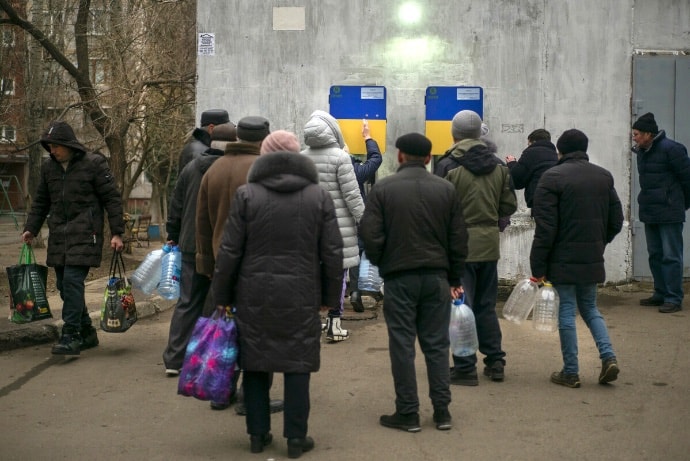
Ukraine Oxfam water points in Mykolaiv. Photo: Kieran Doherty / Oxfam
Hello, please introduce yourself, including your position(s) at Oxfam, and where you are stationed.
My name is Tara Gingerich. I am the Humanitarian Director at Oxfam America. Oxfam America is headquartered in Boston, though I live in Maine and work remotely. I have worked for Oxfam for over 15 years.
Tell us a bit about Oxfam and how Oxfam initiated programs to help refugees…
Oxfam is a global organization that fights inequality to end poverty and injustice. We work with local organizations to address urgent humanitarian needs and protect lives when disaster strikes, and at the same time, we tackle the root causes of poverty, for the long term. We advocate for economic justice, gender equality, climate action, and to transform the global humanitarian system. And we demand equal rights and equal treatment so that everyone can thrive, not just survive.
Oxfam’s creation was actually tied to supporting refugees. We were founded in 1942 – as the Oxford Committee for Famine Relief (eventually shortened to its postal code abbreviation “Oxfam”) – in order to support refugees in Greece.
Although the organization is not dedicated exclusively to supporting displaced persons, displacement puts people in such a vulnerable context that they are a significant priority of our humanitarian work.
What are some of the key programs that Oxfam implements to help refugees?
Oxfam partners with local organizations to help refugees and other displaced people around the world with their immediate basic needs as well as advocate for their long-term wellbeing—both in their own nations, and in the countries that host them. We engage with allies and government officials at all levels to focus on peace and find sustainable solutions to the conflict and violence that ruin so many lives. We push for wealthy countries to welcome refugees and generously attend to their needs. And we advocate for public policies that protect the rights of displaced families as they strive to rebuild their lives and fight to provide for their children a more equal future—in their own countries or the ones in which they settle.
Oxfam supports both displaced people who remain within their own countries (“internally displaced persons,” or IDPs) and those who have crossed into another country as they seek safety and security (“refugees”).
Our humanitarian programming for both groups of displaced people tends to be in the major areas, or sectors, in which Oxfam has expertise: water, sanitation, and hygiene; food and economic security, including livelihoods; and “protection,” which is a catch-all term for activities that keep people safe from harm in crisis contexts. Examples of our work include providing clean, safe water; building latrines; providing people with cash to purchase food or, if there is no food available in a community, providing actual food; providing them with training to help find work in their new environment; and helping people to access services for everything from legal advice about their rights to care and justice following gender-based violence.
As I’ll describe below, we are frequently conducting this work in partnership with civil society organizations in the countries in crisis and the countries hosting refugees.
One distinguishing feature of Oxfam – and an aspect that drew me to Oxfam many years ago – is that we are a rights-based organization, which means that our work is guided by the legal standards found in the range of international human rights treaties and conventions, commitments that governments make, and the values and principles that inform them. Displaced people, particularly refugees, are protected under international law. And in the past several years, governments have signed onto global frameworks governing refugees. Oxfam works to make sure that affected people know their rights, we advocate on their behalf to the US and other influential governments, and we facilitate affected people engaging in their own direct advocacy.
Oxfam is assisting people in most of the largest displacement crises today, include Syria, Ukraine, Venezuela, South Sudan, and Myanmar.
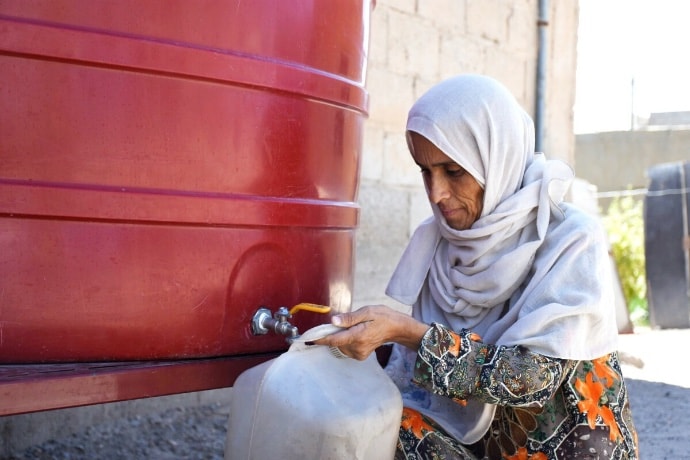
Syria Arab Republic: Marwa – Deir Ez-Zor Emergency Response. Photo: Dania Kareh / Oxfam
For example, the crisis in Syria, which started in March 2011, continues to cause tremendous human suffering to people both inside and outside the country. More than 12 million people have fled their homes, many more than once. Oxfam is helping more than 1.5 million people in Syria who have been displaced by the conflict and refugees in Jordan, Lebanon and Turkey. In Syria we are helping people with clean water, cash, essential clothing items, and support to help make a living and grow nutritious food. In Lebanon, Jordan, and Turkey, Oxfam is helping refugees affected by the crisis as well as people in need in the communities hosting them. We are also working with partners and allies across the region and beyond to advocate for peace, and to ensure that the voices of women, youth, and refugees are included in discussions about policies that affect them.
Closer to home, Oxfam has supported families in Central America as they flee to the US in search of safety, providing lifesaving assistance at camps and shelters along their journey and supporting employment opportunities. When necessary, we have responded along the migrant caravan routes in Guatemala and Mexico with humanitarian aid, including distribution of hygiene kits, food packages, and water, and installation of portable toilets, showers, and drinking water points for thousands in need.
As an advocacy organization, what are some initiatives Oxfam has in place for advocating for refugee rights and safety?
Oxfam has several advocacy objectives related to refugees. First, you might be surprised that this is necessary, but our first objective is that refugees are able to participate – meaningfully – in discussions and decisions that affect them. We also advocate for bringing a gender focus to refugee response, which is necessary because women face specific needs in displacement settings, yet programming for displaced people continues to often be gender-blind. Third, we advocate for shifting power to refugees and refugee-led organizations so that they are in the driver’s seat of decision-making and so they have the capacity to represent and support their communities. Our fourth objective addresses the fact that the vast majority of the world’s refugees are hosted in low- and middle-income countries, whose support of refugees puts extraordinary pressure on limited resources and host communities; as a result of this imbalance, Oxfam calls on UN member countries to share this responsibility, as they agreed to in the 2018 United Nations (UN) Global Compact on Refugees.
Oxfam advocates for refugee rights in many different contexts and to different stakeholders. We advocate for the rights of displaced people in specific humanitarian crises. This advocacy is often targeted toward displaced people’s own governments, the governments hosting them, and other governments that have influence in the context.
We also advocate at the global stage to change the way support and protection are provided to displaced people and to transform the global system itself. We participate actively in fora like the biannual Global Refugee Forum hosted by the UN and in conversations with the UN refugee agency, the UN High Commission for Refugees (UNHCR). For example, this past summer, there was a multi-day meeting of UNHCR and non-profit organizations (NGOs) like Oxfam in Geneva, Switzerland. At that event, we organized and co-led an event focused on approaches to refugee protection that are gender-sensitive, inclusive, and locally led. We also supported the attendance of the leader of a refugee women-led organization in Uganda, who would not have been able to attend and participate otherwise; this is what we mean by facilitate participation of refugee leaders in policy and decision-making spaces.
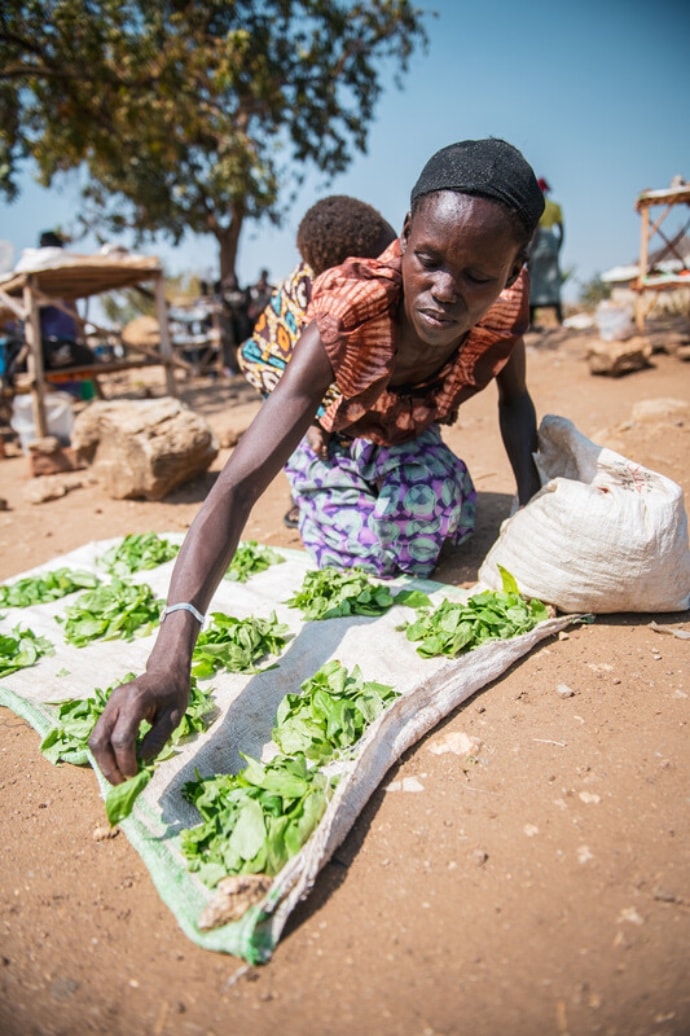
Uganda: Vicky – the world’s strongest mother. Photo: Hans Bach / Oxfam
I understand you partner with many local organizations for this work. How do you identify and engage these partners, and what qualities do you look for in successful partnerships?
That’s right. At Oxfam, we work in partnership with civil society, women’s rights, youth, faith and community groups as well as state, private sector, foundations, and non-government organizations. In our humanitarian work specifically, we are committed to working in partnership with grassroots humanitarian aid providers – local- and national-level organizations in crisis-affected countries – and to ensuring that we are supporting them to have the technical skills, funds, and influence they need to take action in emergencies and to be sustainable. While Oxfam continues to deploy its own staff to respond to major disasters, we are increasingly focused on promoting local humanitarian leadership.
What’s more, Oxfam has a track record of actively collaborating with refugee-led organizations across the globe and particularly in Africa. We partner with refugee-led organizations because they know best when it comes to the particular needs of their community, and what solutions are appropriate and most likely to be effective. We began this area of work, advocating for refugee participation and leadership, in Ethiopia and Uganda, where there are significant displaced populations, primarily from South Sudan. There are a number of barriers facing refugee-led organizations, including tension with host communities and restrictive laws affecting organizations’ ability to register legally, open a bank account, and so on.
Oxfam is currently implementing a program in Ethiopia and Uganda, with support from a US foundation, in which we are seeking to strengthen the capacity of refugee-led groups in the two countries and elevate their leadership in national, regional, and global fora (to make sure they have “a seat at the table” in spaces where decisions are being made about refugees, and to hold policymakers accountable for commitments they have made). I’m actually in Addis Ababa, Ethiopia this week, attending an learning workshop as part of this project, and I am truly inspired by the personal resilience, commitment, and creativity of the refugee leaders with whom we work, many of whom have faced great personal trauma.
Your question about how we identify and engage with partners in our work to support refugees is a good one. In general, I would say that Oxfam looks for organizations whose values and vision align with ours, who are doing good, accountable work on behalf of their communities, and who currently, or wish to, conduct programming in the areas in which Oxfam specializes. We seek to partner with both refugee-led organizations and local and national humanitarian organizations from the host community.
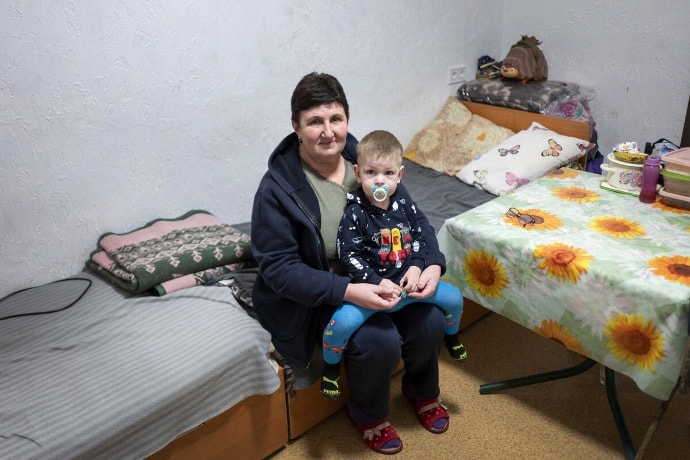
Ukraine: Lydmyla and her grandson. Photo: Kieran Doherty / Oxfam
To give you an example, I visited Ukraine a few weeks ago, where I was able to observe a handful of our programs supporting some of the 3.7 million internally displaced Ukrainians and meet some of our partners. In Ukraine – and in the programs we led in surrounding countries during the period that there were significant numbers of refugees in those countries – Oxfam has prioritized partnerships with organizations working directly with people who often face additional barriers in accessing aid. As a result, we are partnering with organizations focused on women, LGBTQIA+, and Roma people, among others, with many of these organizations providing assistance to displaced people. For example, we met with partner organizations providing vocational training and small grants to help displaced people set up businesses, support to people who have experienced gender-based violence, and basic needs for and advocacy on behalf of displaced people facing discrimination – all in the context of an active conflict.
What are some trends you are seeing in this past year regarding refugees and IDPs?
We are incredibly concerned by the trends in displacement worldwide. Based on data from UNHCR, an estimated 117.3 million people worldwide are forcibly displaced as of the end of last year, and they estimate that those numbers have only increased this year.
As of the end of 2023, one in every 69 people in the world is forcibly displaced. That is 1.5 percent of the world’s population.
These figures reflect a dramatic increase in recent years. The current figures are nearly double what they were 10 years ago, and they increased 8 percent in the past year along (2022-2023).
Of the 117.3 million displaced people, the majority – 68.3 million – are internally displaced, while 43.4 million are refugees (having crossed an international border).
Oxfam has conducted research on the impact of climate change on displacement. We found that climate-fueled disasters are the number-one driver of internal displacement, forcing an estimated 20 million people per year from their homes. A person is seven times more likely to be internally displaced today by extreme weather disasters such as cyclones, floods and wildfires than by geophysical disasters such as earthquakes and volcanic eruptions, and three times more likely than by conflict.
What are you most hopeful about?
A few things give me hope. First, the international community has recently made commitments of how they are going to protect refugees, through the 2018 Global Compact on Refugees and the 2019 Meaningful Refugee Participation Pledges. Refugees and the organizations that represent them (from refugee-led organizations and other local and national organizations to international NGOs like Oxfam) will be able to hold these commitments up to governments and demand accountability and transparency.
Second and relatedly, the international community seems to finally, finally be committed to local humanitarian leadership, which will mean that refugee-led organizations and other local and national civil society organizations should increasingly have the resources and power to represent their communities, which I believe will result in more effective humanitarian assistance for displaced persons and all people affected by humanitarian crises.
And, finally, I am inspired by and optimistic because of the bravery, perseverance, and commitment of refugees and refugee leaders to regain security and dignity and create good lives for themselves and their families.
Additional stories about Oxfam’s work with refugees:
Sudanese refugees fleeing conflict find refuge in South Sudan
Finding safety, but struggling for better nutrition in refugee camp
Water supply for refugee camps a constant challenge in Ethiopia
The Sex Truck, and women on the move
In the Rohingya camps, a taste of joy
Goalmaker
Empowering Resilience: Supporting Women and Children amid Ukraine’s Conflict
By Amber Cortes
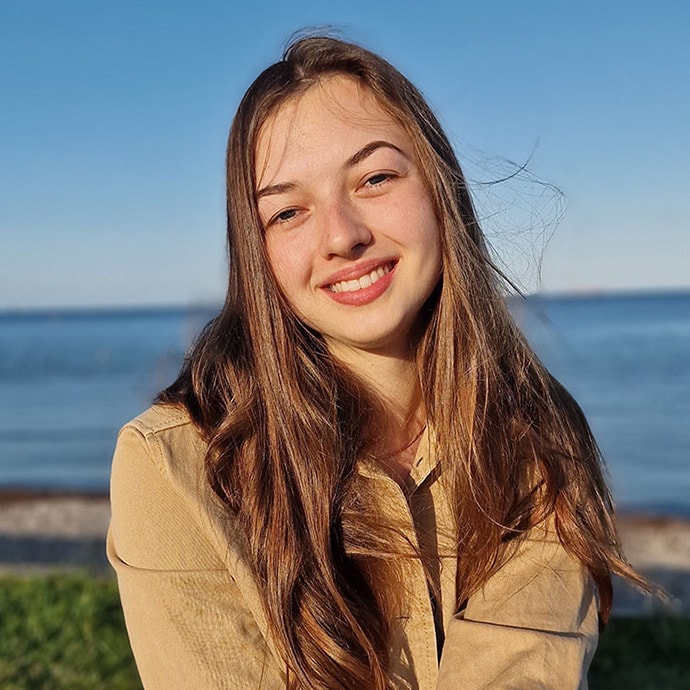
Anastasiia Zhelezko. Photo: Global Communities
Anastasiia Zhelezko had planned her humanitarian career since 3rd year of her Bachelor’s degree. She was finishing her degree at Taras Shevchenko National University of Kyiv in 2022, already with the intention to work in the humanitarian field, when Russia invaded Ukraine, and everything happened faster than she thought.
“I guess the invasion just sped up my plans,” Zhelezko explains.
She started working in Chernihiv, her native region, with the Danish Refugee Council, assessing the damages of the houses of the conflict-affected population.
“Especially in the beginning, it did affect me,” Zhelezko says. “Obviously, I’ve heard lots of stories of what they had been through. These were terrible stories.”
Despite the emotional challenges, Zhelezko felt she was in the right place.
“I realized that currently, the history of Ukraine is being created, and if I want to contribute to it, working in the humanitarian sphere is probably one of the best options to help address people’s needs.”
Since March 2024, Zhelezko has been doing just that by overseeing partner implementation of GBV programming for Global Communities, an organization that works at the intersection of humanitarian assistance and sustainable development to save lives, advance equity and secure strong futures. Global Communities implements several projects in Ukraine, including the Community-Led Emergency Action and Response (CLEAR) program, which Zhelezko works on. CLEAR supports local organizations in addressing urgent protection, shelter, water, sanitation and hygiene needs of conflict-affected populations. Child protection, gender-based violence (GBV) prevention and response, and psychosocial support are among CLEAR’s key interventions. There’s also the Chernihiv Public Committee for Human Rights Protection, which provides legal consultations and support to women who have experienced GBV, especially domestic violence.
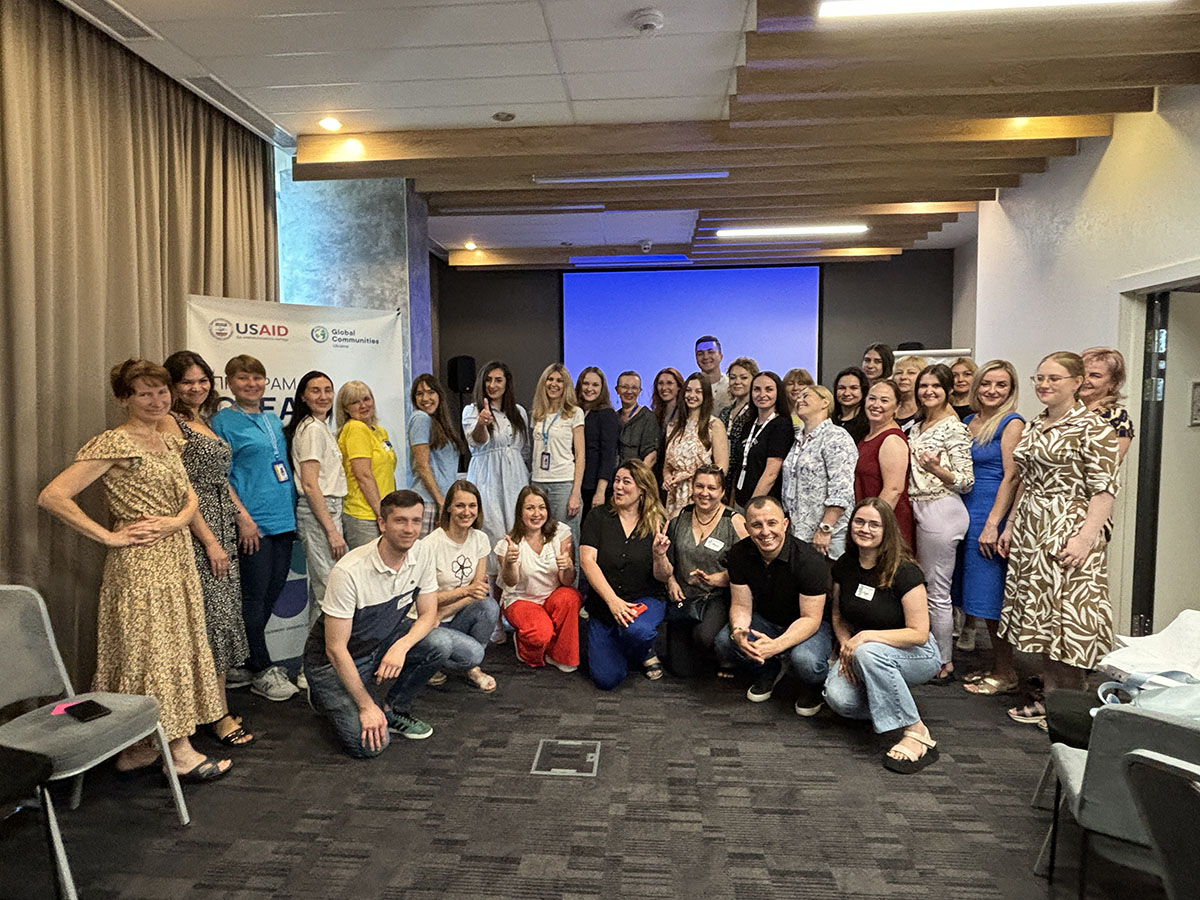
Global Communities hosts the Protection School for local partners in Ukraine. Photo: Global Communities
CLEAR uses a localization approach in humanitarian action. This includes implementation through local partners (rather than direct service provision) and strengthening the capacity of local organizations, including small community-based groups, to deliver emergency response.
In her role, Anastasiia provides direct support to GC partners in implementing their activity plans, engages in distribution of Dignity and Recreational Kits for vulnerable populations, as well as maintains working relations with other relevant stakeholders, such as Danish Refugee Council, Clusters, UN Agencies, etc. She also helps facilitate activities within other Protection subsectors at GC, such as PSS and CP.
Global Communities supports these partners by providing technical expertise, such as training in various fields (for example, in July a Protection School was conducted outlining core concepts of GBV, CP and PSS), recommendations on any mundane activities and how to make them more efficient, supervisions, as well as familiarizes them with international standards in above-mentioned Protection sub-sectors (for instance, Minimum Standards for Gender-based Violence in Emergencies Programming, Case Management SOP) amongst other activities to increase the capacities of local partners and enable them become self-sufficient when donors step out of Ukraine.
One of the organizations that Zhelezko supports is Chernihiv European, which hosts events for children with disabilities, who are often underserved by state services. The organization works both with internally displaced children and children from host communities. Another partner, Polissia Foundation for International and Regional Studies (PFIRS), helps elderly people works to improve information literacy of the elderly in local communities by teaching them how to use laptops and smartphones, as well as the latest information technologies (i.e. government services apps, messengers, mobile banking, etc.), Google tools, online services (requesting document extracts, certificates, documents in Diia, etc.), as well as in safety against online scams, etc.
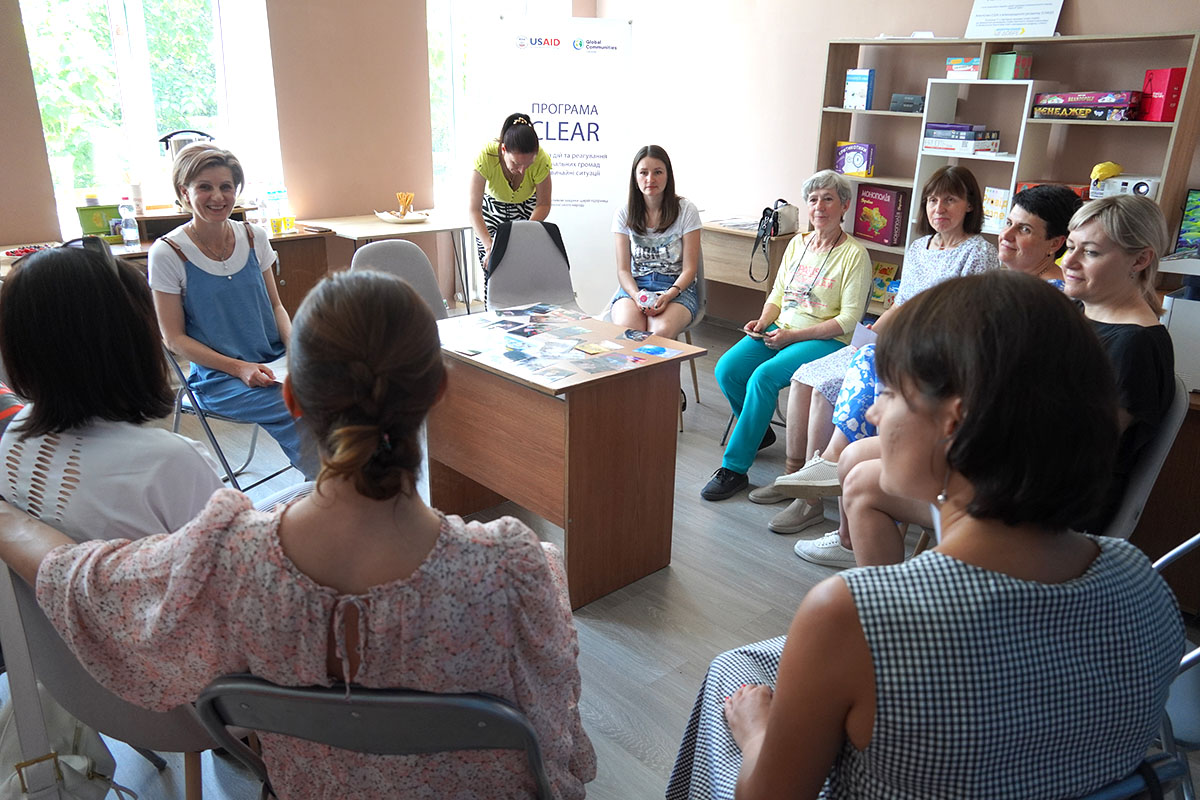
Psychosocial counselling sessions for internally displaced women at the Khotyn Public Library. Photo: Global Communities
Within all the chaos of conflict, it’s the astonishing work of what CLEAR’s partners are able to accomplish under such intense circumstances that keeps Zhelezko inspired.
“There were cases where women were living with perpetrators and suffered a lot. They’ve been through horrible moments in their lives. Thanks to Chernihiv Public Committee for Human Rights Protection, our local partner, they were able to take their kids with them to a safe space, find sources of income, get alimony from their husbands, and start their lives from the scratch,” says Zhelezko.
“The quality of their lives has dramatically improved, thanks to legal consultations and the case management services of our partner.”
Needless to say, working in a conflict zone can make long-term planning difficult. Programs must constantly adapt to new conditions.
“The situation is always changing,” says Zhelezko. “We write technical proposals for the next six months, but the context can change dramatically over this time.”
As if the complexity of providing aid in a war-torn country wasn’t enough, there are also sociocultural dynamics at work.
“There are lots of stereotypical beliefs embedded in our culture, because it’s a deeply patriarchal society,” says Zhelezko. “There are gender stereotypes in all spheres: in education, in health, politics…you name it.”
Despite the fact that female labor participation in Ukraine is at an all-time high of 47%, women face challenges balancing new employment opportunities with traditional roles at home. As more men become conscripted, the pressure on women to be both breadwinners and caretakers increases.
“The majority of domestic work is still being performed by women,” Zhelezko says. “It didn’t just disappear.”
In Ukraine, women and children represent the majority among displaced people–more than 90% of refugees and more than 60% of internally displaced persons (IDPs) are women and children.
“These women are not a homogenous group, and accordingly, we also have to recognize that their experiences and needs are different.”
Women and girls with different sexual orientations, religion, health conditions, ages have different needs and aspirations at different stages of their life.
Nowadays, says Zhelezko, women in Ukraine are opening businesses at an astonishing rate and taking up professions previously dominated by men. Global Communities has recently initiated a grant competition for micro and small businesses within the Economic Recovery and Market Systems (EMRS) component of the CLEAR project. The hope is that many women will benefit from this initiative.
“I just see our partners and us working relentlessly in this field and empowering women and making them believe they have enough inner strength and they can do just fine,” says Zhelezko.
Zhelezko believes that even in the worst of conditions, progress can be made towards an environment where women and girls can not only be safe, but thrive.
“Our work is not only about helping people address their needs, but also about being able to help them find hope to do things which they thought were unimaginable to them a few years ago.”
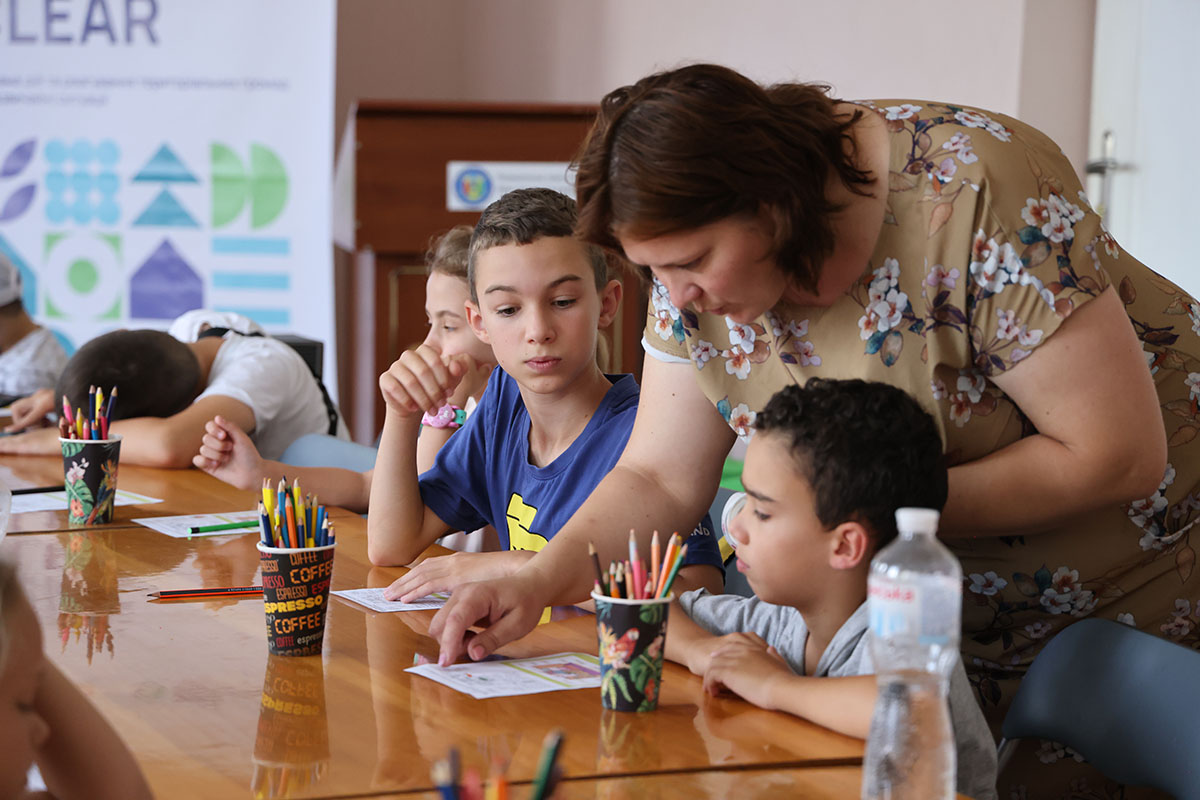
Khotyn Platform for the Development of Culture and Tourism hosts an English camp for children. Photo: Global Communities
To learn more about Global Communities’ work in Ukraine, explore their visual story, Governing in Crisis: Layering Decentralization Assistance and Emergency Response in Ukraine and read an interview with their Senior Protection Manager, Emily Galloway, Pass the Mic: Localizing Child Protection Interventions in Ukraine’s Humanitarian Context.
Member Blogs
International Rescue Committee
IRC – Supporting Refugees Locally
USA for UNHCR
Global Mentorship Initiative Partners with USA for UNHCR, the UN Refugee Agency
Welcome New Members
Please welcome our newest Global Washington members. Take a moment to familiarize yourself with their work and consider opportunities for support and collaboration!
CORE Tanzania
CORE Tanzania’s mission is to increase access to quality education in rural Tanzania. We envision a future where every child in rural Tanzania is educated to reach his or her maximum potential, creating village communities that are thriving both economically and socially, and contributing to a positive and sustainable future for the country. coretanzania.org
Elevate Destinations
Elevate Destinations is an award-winning, boutique travel agency that partners with numerous global nonprofits. It was founded and operates as a social enterprise: philanthropy, and positive social and environmental impact is key to our mission. Elevate Destinations has pioneered the field of donor travel and learning journeys and is able to provide responsible travel to any region of the globe. elevatedestinations.com
Water.org
Water.org is a global nonprofit organization working to bring water and sanitation to the world. We help people get access to safe water and sanitation through affordable financing, such as small loans. Water.org
Community Events
October 1
October 5
Mona’s 25th Anniversary Celebration, Oct. 5th, Benaroya Hall, 7-9PM
October 6
October 10
A Night in Afghanistan, Sahar Education, 2nd Annual Gala
October 12
Schools for Salone | Building Brighter Futures Dinner
October 21
Philanthropy Northwest PNW24 Conference
October 22
Gates Discovery Center: Hope Away from Home: An Evening with Emi Mahmoud –
October 24
DEVEX WORLD 2024 (online and in-person)
Career Center
Communications and Advocacy Manager – Resilient Water Accelerator WaterAid
Climate & Water Manager – Resilient Water Accelerator WaterAid
Development Coordinator PeaceTrees Vietnam
Director of Development Water1st
Senior Director of Development The Max Foundation
Development Associate Upaya Social Ventures
Director of Development World Affairs Council
Check out the GlobalWA Job Board for the latest openings. Back to Top
GlobalWA Events
October 3
Members-only: Storytelling Workshop – Turning Strategy into Story
December 3-4